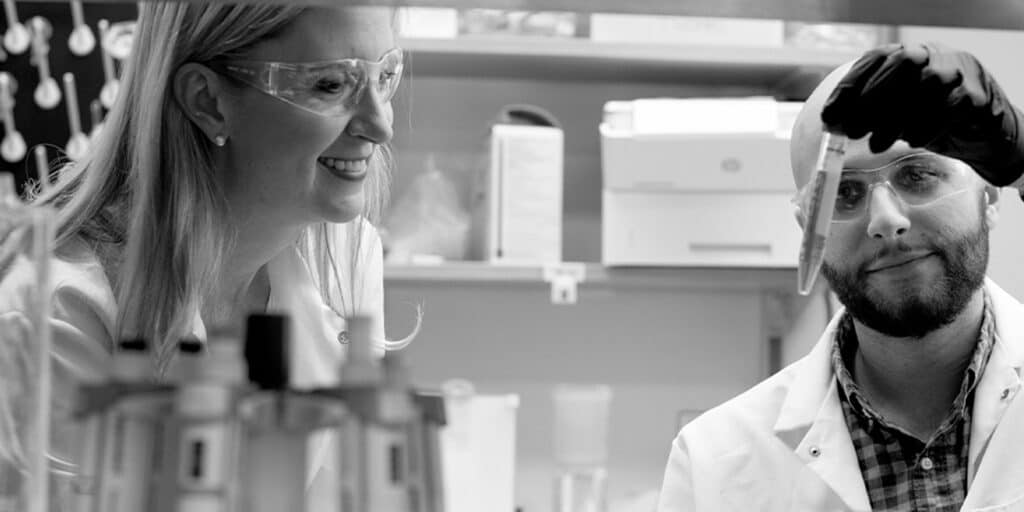
Susan G. Komen® hosted the Metastatic Breast Cancer (MBC) Collaborative Research Summit on October 13, 2022, in Durham, North Carolina. The Summit is a key event of the Komen Metastatic Breast Cancer Collaborative Research Initiative (MBCCRI), which was launched to inspire collaboration between two renowned cancer centers – Duke Cancer Institute and the University of North Carolina Lineberger Comprehensive Cancer Center. While often rivals in other settings, the two institutions are united by a shared desire to accelerate the discovery of treatments that will help people with MBC to live longer, better lives.
This year’s MBC Collaborative Research Summit featured scientific presentations from the recipients of Komen’s first-ever MBC Collaborative Research Grants, as well as a discussion featuring a patient advocate’s perspective and group breakout sessions that focused on current gaps in MBC research and possible solutions, with the goal of sparking more innovative MBC research ideas for the researchers in attendance.
Keynote speaker and Komen Scholar Yibin Kang, Ph.D., Warner-Lambert/Parke-Davis Professor at Princeton University, presented key findings of his own research that focuses on the cellular origins of MBC. The presentation discussed how MBC cells differ from normal cells, as well as the biological changes that lead to tumor growth and metastasis.
With data that has been collected over several years, Dr. Kang and his team have identified a protein that is present in metastatic breast cancer cells but not normal mammary cells. Blocking this protein reduced the ability of cells to move and grow in new sites as metastases. His team is now working to develop a drug that will target this protein while giving minimal side effects. This kind of innovative MBC research is what the MBCCRI is hoping to catalyze in North Carolina.
There are exciting projects on the horizon for MBC research in North Carolina. At the MBCCRI Summit, many questions were asked of the presenters, and several new collaborations were formed on the spot from those questions and responses. An area that received attention for collaboration between Duke, UNC and Wake Forest University focused on how diet and nutrition can impact treatment outcomes for MBC patients and the role of the microbiome on cancer and responses to current treatments. Other collaborations focused on what biomarkers may be clinically useful, and which ones might help researchers determine the best treatment options for an individual.
All the presentations and discussions focused on how to provide better outcomes for people with MBC and how to increase their quality of life. As part of the Summit, all attendees joined different breakout sessions, where they could discuss various topics and brainstorm viable solutions. Repeatedly, attendees discussed the urgency to make clinical trials more accessible to a broader population and to target the needs of individuals that should be enrolled, especially those with MBC who want to participate and are often excluded.
As David Vaught, Ph.D., Komen’s Senior Manager of Research Grants observed, “Many clinical trials include exclusion criteria that prevent people with MBC from enrolling. Patient advocates and researchers alike challenged the need for all the exclusion criteria often included in clinical trials. With some of these exclusion criteria in place, certain subgroups or populations who are not enrolled in the trial that might benefit from or respond better to a treatment might be missed or completely overlooked.” This was seen recently in the HER2CLIMB trial results, where MBC patients that were taking brain medications responded well to the experimental treatments.
A key takeaway from this year’s Summit was the importance of continuing the ongoing collaboration and open communication between the various stakeholders in MBC research. While patient advocates can offer key insight into patient needs and help researchers develop a more strategic design at the front end of a clinical trial, researchers can also use real-world patient experiences and clinical data to design more effective studies.
As the MBCCRI is proving, two is better than one, and by removing research silos and leveraging expertise at both institutions, MBC can be transformed from a terminal diagnosis to a chronic disease, giving patients and their families the priceless gift of time.



